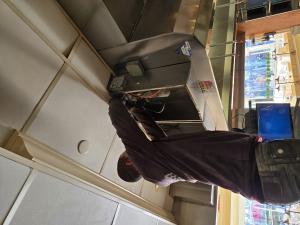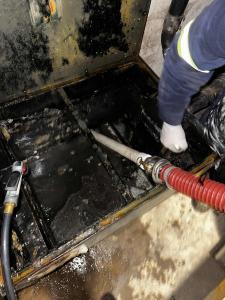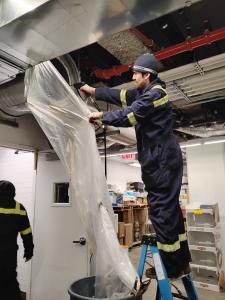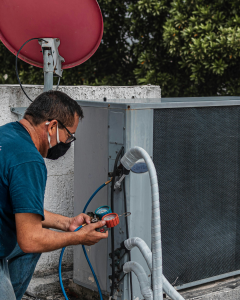NYC Kitchens Embrace Comprehensive Maintenance Services for Compliance and Safety
New York City’s restaurant kitchens face strict fire and health regulations, making routine maintenance crucial.
BROOKLYN, NY, UNITED STATES, August 30, 2025 /EINPresswire.com/ -- New York City’s restaurant kitchens face strict fire and health regulations, making routine maintenance crucial. Facility and restaurant managers across Manhattan and the five boroughs say scheduled services from grease trap cleaning to hood filter changes, hood installations and expert repairs are key to staying open and safe. “In New York, we don’t mess around with compliance,” says John Rossi, a veteran technician at Filta Kleen in Manhattan. “One dirty hood filter or clogged trap, and you can be facing a visit from the Health Department or the FDNY and that can mean fines or even a shutdown.” For them, scheduled maintenance is as crucial as any ingredient in the kitchen, Rossi says. Skipping a cleaning or filter change is a gamble no restaurant can afford, he adds.Proper grease management is the foundation of any kitchen’s maintenance plan. Rossi explains that Filta Kleen now offers scheduled grease trap cleaning Manhattan NY and grease trap cleaning NYC services to remove oil and fat from kitchen waste lines. Routine trap pumping prevents backups that can flood floors or contaminate surfaces. “We tell managers: if you see yellow grease pooling, you need help,” Rossi says. Skipping pumps may save a few dollars at first, but city regulators are unforgiving an overflowed trap can trigger violation notices or big fines. Filta Kleen technicians note that they often find traps overdue by months, and they work overtime to clear them before inspectors issue violations.
In busy New York kitchens, monthly or quarterly grease trap cleaning is common. Besides protecting the drains, it improves hygiene. “It’s simple: clean traps equal a cleaner, safer kitchen,” says Maria Lopez, Filta Kleen’s Bronx-area manager. Lopez recalls an Astoria diner whose trap was completely blocked it backed up into the kitchen sink. “The owner spent twice as much fixing pipes and paying fines as he would have on routine cleanings,” she notes. The city’s regulations require operators to keep detailed grease-trap maintenance logs. Filta Kleen’s crews know the New York Department of Environmental Protection guidelines and maintain thorough records of each pump-out, so restaurant owners can easily prove compliance if inspectors call.
Kitchen exhaust hoods rely on grease-catching filters above stoves and fryers. When these filters clog, smoke and grease pass into the ducts and the exhaust fan must work overtime. Scheduling a regular hood filter exchange service ensures filters are fresh. “Imagine the filters as your kitchen’s last line of defense,” says Tony Marino, a Brooklyn-based Filta Kleen technician. “If they aren’t changed, the ductwork heats up with oil and the fan burns more electricity.”
Managers often search for a “hood filter exchange service near me.” Filta Kleen has technicians in every borough ready to swap filters on a set schedule weekly or biweekly, depending on cooking volume. This saves staff time and keeps ventilation at peak efficiency. For example, Marino recalls a Midtown grill where filters hadn’t been changed in months: “You could pull a film of grease right off them,” he says. After Filta Kleen installed new filters, “the kitchen ran cooler and smelled cleaner, and the manager was amazed at the energy savings,” Marino reports.
Some high-volume restaurants add a precipitator for restaurant exhaust to their systems. Formally known as an electrostatic precipitator, this device electrically charges grease particles so they stick to metal plates. It catches fine grease and smoke that standard filters may miss. “Precipitators are like an upgrade to the system,” says Lopez. “They grab the fine grease that would slip past regular filters.”
However, a precipitator still needs maintenance. Filta Kleen cleans and inspects the unit as part of its service, washing the collection plates and checking the power supply. Lopez emphasizes that any grease-capture device left unchecked can become a hidden hazard. Fire safety experts warn that grease buildup in ducts is a major ignition risk – a single flame can spread quickly if it encounters accumulated oil. “You don’t want a spark meeting a crusty hood or duct,” she says. Filta Kleen’s team notes that running a precipitator and still monitoring filters closely creates layers of protection: the precipitator catches most fine grease, filters catch coarser particles, and routine cleanings clear the rest. This synergy of systems keeps the ducts cleaner, the air cleaner, and dramatically lowers fire risk.
When a kitchen is remodeled or expanded, a new exhaust hood may be required. A commercial hood installation service involves designing a canopy hood and ductwork that comply with code. New York City’s fire and building codes demand that hoods meet NFPA-96 standards, include fire suppression, and be installed by licensed professionals. “Cooking hood installation isn’t a DIY project,” says Diego Martinez, a licensed hood installer at Filta Kleen. “We recently helped a Manhattan caterer upgrade to a bigger system. It’s not just plumbing it’s life safety.”
Proper hood design is vital. Martinez notes, “If the hood isn’t sized or vented correctly, smoke and grease will escape and violate code. We make sure it’s right for the cooking line.” For example, on a Queens project, Filta Kleen installed a 20-foot hood with integrated fire suppression overnight, so the restaurant missed only one breakfast service. For newly installed systems, Filta Kleen also provides on-site training. Martinez says technicians demonstrate filter swaps and maintenance checks with the managers.
Another key to compliance is who does the work. New York City requires that hood cleaning and repairs be done by certified professionals. Filta Kleen employs licensed hood repair technicians who hold the required FDNY Certificates of Fitness. “Anyone can claim they clean hoods, but only licensed techs are allowed to do it legally here,” says Kevin Patel, Filta Kleen’s training coordinator. Inspectors will check the license number on the hood sticker after a cleaning; if it’s missing or expired, the restaurant can be cited on the spot.
Licensed techs also bring thoroughness. Patel notes that some providers cut corners. “I’ve seen crews who didn’t even open the duct to scrape grease,” he recounts. “Our licensed technicians lift every panel and clean it right. It makes all the difference for compliance.” Only a licensed hood repair technician can legally modify or replace ductwork or fans to solve problems. This ensures any repairs meet code and keep the system safe. For managers, having a licensed technician is peace of mind. Patel adds, “Our certified techs don’t just meet the code; they often spot hazards others miss.”
Routine inspections by qualified technicians uncover hidden problems before they cause shutdowns. Patel explains, “During a cleaning, a tech might notice a sagging duct or a failing fan. Fixing it now means avoiding a breakdown on a busy night later.” Owners appreciate that vigilance it’s what keeps kitchens operating smoothly.
Technology and regulations are both pushing the industry toward proactive maintenance. Filta Kleen’s staff report that many managers now expect digital records and reminders. “We have a mobile app and portal for clients,” Patel says. “Every job is logged with date, time and a photo. Managers can see past cleanings at any time.” The system even flags tasks when they’re due. “Our system won’t let a job slip by – if a service is overdue, the app pings us until it gets done,” Lopez explains. In practice, Filta Kleen’s customers appreciate getting a text notification when crews are en route and even a photo of the cleaned trap or filter afterward. “It’s like having a digital proof-of-service,” Lopez says.
Regulators are catching up with technology too. New York’s Rangehood Unit now requires restaurants to submit quarterly cleaning reports via an online portal. Lopez recalls a client who thought his hood was cleaned last month, but the system had no record; he got a notice from the FDNY. “We fixed the paperwork, but it underscored that if it’s not documented, it’s as if it didn’t happen,” she notes.
Some restaurants and landlords are also formalizing maintenance. Patel says some commercial leases even hinge on service records: landlords require proof of recent hood and grease-trap cleanings. Filta Kleen helps customers stay ahead by ensuring no visit goes unrecorded.
Managers say the real advantage comes when all these services are coordinated. “We act like part of their staff,” Lopez describes. “If we’re there to pump a trap, we’ll also look at the filters. If filters are due, we’ll change them and schedule the hood cleaning. One call covers everything.” By centralizing maintenance under one provider, managers save time and often money. Bundled service packages such as combining trap cleaning with quarterly hood service typically reduce total fees. Lopez adds, “Our customers like having one contact and one invoice, instead of juggling multiple vendors.”
One customer said, “I don’t even have to think about it anymore,” Lopez reports. “My maintenance is on auto-pilot now,” the owner told her. Filta Kleen tracks each account digitally, ensuring jobs never slip through the cracks. “Our system flags a task as soon as it’s due,” Lopez explains. “It won’t be missed we handle it at the next visit. It’s like a built-in safety net.” For multi-location operators, bundling simplifies budgeting too. “Chains know exactly what they’ll spend each month, instead of sudden repair bills,” Lopez says. The predictable schedule helps managers plan ahead and keeps every kitchen in compliance.
Constant upkeep also extends equipment life and efficiency. A clean hood and fresh filters let exhaust fans run cooler, shaving electricity costs. Each successful maintenance cycle means fewer breakdowns and longer-lasting machines. “Paying a few hundred for maintenance beats paying thousands later,” Rossi says. “It’s just smart business management.”
Managers learn the hard way that skipping maintenance leads to dire consequences. Lopez warns, “Grease left in traps or ducts attracts pests and causes odors. A backed-up trap can shut you down for sanitation, and a dirty hood is a fire waiting to happen.” In New York City, such lapses trigger strict penalties. Health inspectors issue violations for overflow or contamination, and daily fines can mount into the thousands. Filta Kleen’s technicians say they’ve been busy during recent inspection sweeps. “We had one noodle shop flagged for overdue cleanings,” Lopez recalls. “They were facing $4,000 in fines until we showed up and cleaned everything.”
The FDNY requires Type I hood systems to be cleaned at least every three months. If a flame or spark touches accumulated grease, it can ignite a flash fire and race through the ducts. Owners recall cases where one small spark caused massive damage and long shutdowns. Eve Chen, Filta Kleen’s Manhattan branch manager, notes the business impact: “When a hood alarm goes off or a trap overflows, every minute of closure is lost revenue. We’ve seen kitchens cancel services, refund customers, even work out of temporary setups while waiting for repairs. That’s why clients tell us: paying for maintenance is better than paying for disaster.” Rossi echoes this: “Routine service is like cheap insurance. A few hundred dollars for a cleaning beats paying thousands later.”
As New York City’s regulatory landscape tightens, facility and restaurant managers realize that maintenance is part of their success strategy. Instead of reacting to crises, they schedule grease trap pumping, filter swaps and hood cleanings on an ongoing basis. “Maintenance is on the menu,” Rossi quips. “It keeps everything cooking.”
For NYC kitchens, regular upkeep means safer, more efficient operations – and far fewer surprises on inspection day. “We treat your kitchen like it’s our kitchen,” Rossi adds. “We keep it in shape so you can focus on the food – that’s how you stay open and compliant.” After all, in a city that never sleeps, downtime is not an option.
Gabriel Jean
Safety Group Corp.
+1 347-445-4880
email us here
Visit us on social media:
LinkedIn
Instagram
Facebook
Legal Disclaimer:
EIN Presswire provides this news content "as is" without warranty of any kind. We do not accept any responsibility or liability for the accuracy, content, images, videos, licenses, completeness, legality, or reliability of the information contained in this article. If you have any complaints or copyright issues related to this article, kindly contact the author above.





